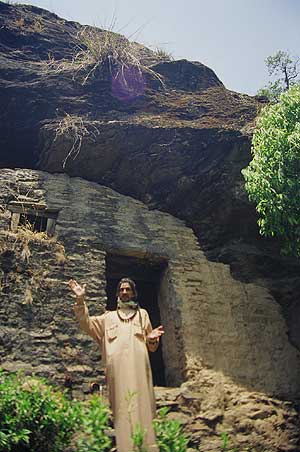| Sacred Space: Reflections Nishkama Karma Yoga
|
||||||||||||||
Isha Vasyamidang Sarvam Yat Kinch Jagatyan Jagat
Tein Tyaktein Bhunjitha Ma Gridhah Kasyaswid Dhanam (Whatever exists in the Universe, whether perishable or imperishable, mortal or immortal, transcendent or immanent, have as their essence, the Ultimate Reality. Live thus without favour or fear, free of desire, indeed without attachment.) Ishavasyopanishad
|
Reflections • Atmabodh • Guru
Masters & Sages
Pilgrim Trails
Bookshelf
If you have wealth, use it for the welfare of humanity. The fruits of wealth should not be 'bhog' or indiscriminate enjoyment - the fruits of wealth should be dharma (righteous action). The fruits of dharma, in turn, are moksha. Right action will lead to freedom from action. Bhog is the fruit of kaam - sense satiation is the fruit of uncontrolled desire. It is directed towards the world.
As long as one lives in the world, one must maintain a practical approach to life. Action should not be determined by mere sense perceptions, but action should be directed towards creating the right circumstances, balance and equipoise, that permit the unfolding of ones essence of spirituality. Action is also part of the divine play; duty and work are also aspects of the divine. Living in the world in no way prevents spiritual attainment. In the Vedic age, the rishis and enlightened sages were adepts of both para and apara - having spiritual attainment, while being accomplished and enormously successful in worldly matters. Raja Janak was a king, Kabir and Guru Nanak were householders, as was Lahiri Mahashaya. They attained the ultimate state of freedom while living in action.
Sant Bulle Shah said that we need food and drink to live. We do not live to eat and drink. He who merely eats, drinks and dies is worth nothing, because he has not sought the purpose of life.
Lord Krishna said in the Gita, in ch 3 shloka 8:
Do that work which is required of you because it is better to work than not to work. Without work, the body itself cannot be maintained. All karma or work should be done having dedicated it to the Higher Self, unattached to the fruits of action. This is niskama karmayog. That work which is offered to the Lord, and done without attachment, frees us, indeed it liberates us. Knowing this, neither seek nor find, but accept instead what comes to you. Free of desire for the results of our action, performing righteous action as our duty, continue to work as long as there is life in you. Only he who lives can be self-realised. The path of action that leads to self-realisation is through the performance of action without attachment.
Lord Buddha said the reason for both our sorrows and our happiness is our karma. Therefore, let us do that karma which creates joy and happiness. He suggested the middle path of right action, right understanding, right thought, right speech, right livelihood, right effort, right mindfulness and right concentration. Through righteous action we are freed of negatives, we are freed of the bondage of the world created through our attachments.
"Karma brahmodh bhavang vidhi". Without knowledge of how to live, we cannot live righteously. So let our karmas be purified by knowledge and wisdom. Thus a karmayogi also becomes a gyanyogi.
The four Vedas, the Rig Veda, Sama Veda, Yajur Veda and Atharva Veda arise from Divine Breath, say the Brihadaranyaka Upanishads (4.5.11). The Vedas are revealed knowledge of the Divine Mind. They are the witness of the manifestation of Parbrahman or the Infinite. Know that the Vedas themselves are the cause of all karmas. Where life exists, karmas or work exists, verily our very being arises from karma.
Karma is the very nature of the world and causality is the law that governs this world. In the world of living, your karma alone determines your very existence.
| |||||||||||||
 The way to live in the world is 'tyag ki bhavna se bhog karo,' (enjoy without the compulsions of attraction and repulsion). Don't satiate yourself, use only as much of any resource as is needed. When you eat, eat as much as you need; don't eat that extra roti (bread), let that be denied with the spirit of tyaga (sacrifice). Enjoy what you eat, but don't indulge in gluttony. One can eat with such extreme enjoyment, that every sense is engaged in the act and there is no restraint or control in it. When bhog (enjoyment) is done with tyaga, it leads to moksha, loosely defined as liberation.
The way to live in the world is 'tyag ki bhavna se bhog karo,' (enjoy without the compulsions of attraction and repulsion). Don't satiate yourself, use only as much of any resource as is needed. When you eat, eat as much as you need; don't eat that extra roti (bread), let that be denied with the spirit of tyaga (sacrifice). Enjoy what you eat, but don't indulge in gluttony. One can eat with such extreme enjoyment, that every sense is engaged in the act and there is no restraint or control in it. When bhog (enjoyment) is done with tyaga, it leads to moksha, loosely defined as liberation.